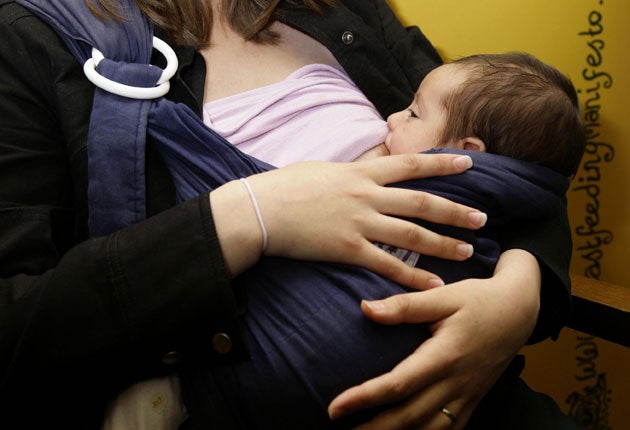Is breast really best? New study suggests feeding babies from breast over bottle ‘doesn’t have impact we think it does’
US scientist suggests other factors have much greater effect on long-term childhood wellbeing

Breast-feeding babies may not actually have the wide-ranging long term health outcomes we think it does, according to new research published in the journal Social Science & Medicine.
Dr Cynthia Colen, a sociology professor at Ohio State University in the US, looked for the first time at a sample of families where one or more siblings had been breast-fed while others had been bottle-fed.
In apparent contrast to perceived wisdom and international health advice, she found that, if anything, those who were breast-fed suffered more from long-term health issues.
Explaining why previous studies have consistently found that breast-fed babies end up being healthier on average, Dr Colen said these projects suffered from “selection bias”.
Factors like a mother’s employment, age and family income skewed the figures, she said, because a mothers who breastfeed statistically have greater than average education, resources and wellbeing themselves.
Dr Colen stressed that her findings do not oppose the view that breastfeeding, in the short term, has clear health benefits for young children.
But with the issue of breast versus bottle proving “statistically insignificant” in the long term for children with the same family background, she said her results showed it was time to focus on other, more important factors.
“I’m not saying breast-feeding is not beneficial, especially for boosting nutrition and immunity in newborns,” Colen said.
“But if we really want to improve maternal and child health in this country, let’s also focus on things that can really do that in the long term – like subsidised day care, better maternity leave policies and more employment opportunities for low-income mothers that pay a living wage, for example.”
Dr Colen’s research analysed 8,237 children, 7,319 siblings and 1,773 “discordant” sibling pairs, in which at least one child was breast-fed and at least one other child was bottle-fed.
When the sample was restricted to siblings who were differently fed within the same families, scores for each child on 10 of 11 health indicators like BMI, hyperactivity, math skills and reading recognition were not statistically different.
The only outlying indicator was asthma – in every sample, children who were breast-fed were at higher risk for asthma than those who weren’t.
Dr Colen said that by comparing within families, scientists were able to take into account “all of those characteristics – both measured and unmeasured – that differ by family, such as parental education, household income and race/ethnicity”.
She said her findings should be regarded as having significance for US health policy.
“If breast-feeding doesn’t have the impact that we think it will have on long-term childhood outcomes, then even though it is very important in the short-term we really need to focus on other things,” she said.
“We need to take a much more careful look at what happens past that first year of life and understand that breast-feeding might be very difficult, even untenable, for certain groups of women. Rather than placing the blame at their feet, let’s be more realistic about what breast-feeding does and doesn’t do.”
Subscribe to Independent Premium to bookmark this article
Want to bookmark your favourite articles and stories to read or reference later? Start your Independent Premium subscription today.

Join our commenting forum
Join thought-provoking conversations, follow other Independent readers and see their replies